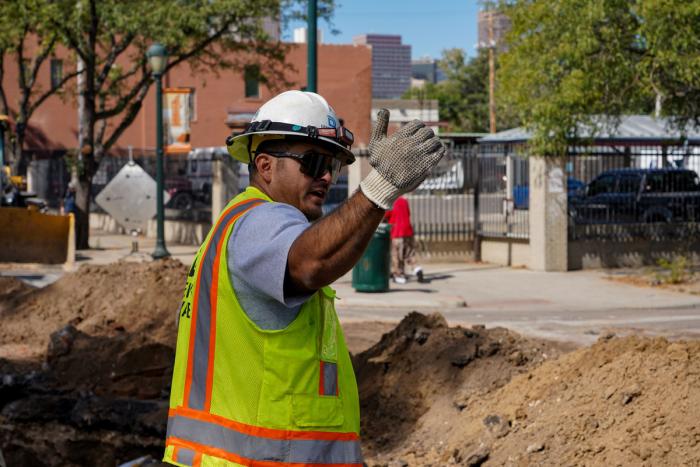New water rates start January 2025
In October, the Denver Board of Water Commissioners adopted rate changes to help pay for critical upgrades and projects to prepare our system for future challenges.
All of our costs are paid for by rates, fees and other sources, such as bond and hydropower sales, not taxes.
The rate changes will take effect Jan. 1, 2025, and will increase bills for most single-family customers by an average of $2 to $3 per month, depending on whether the customer lives in Denver or in one of our suburban water districts. (This calculation is based on an annual water use of 104,000 gallons; individual customer use will vary. Monthly bills in the winter are typically lower than in the summer when water use is higher due to outdoor irrigation.)
We expect to invest $1.8 billion over the next 10 years in projects that will maintain, repair, protect and upgrade the water collection, treatment and delivery system, making it more resilient and flexible in the future and ensuring it will continue to deliver a clean, safe, affordable and reliable water supply to 1.5 million people.
From more frequent droughts and wildfires to additional regulations that we expect we’ll need to meet — we will be prepared.
Information about the 2025 water rates
To keep water affordable and to encourage conservation, Denver Water’s single-family residential rate structure includes three tiers based on how much water you use. Indoor water use — for bathing, cooking and flushing toilets — is essential for human life and is charged at the lowest rate. Efficient outdoor water use is charged in the second tier (middle rate), followed by additional outdoor water use in the third tier (highest rate).
In addition to variable charges based on water use, the rate structure also includes a monthly fixed charge based on the size of your water meter.
Why are rates going up?
Our employees continue their around-the-clock work running a large, intricate system that spans 13 counties across Colorado. And we have been making major investments in our system to maintain efficient operations, prepare us for a warmer climate with more extreme weather patterns and ensure we can meet new regulatory requirements in the future.
These efforts include the recent completion of a new, state-of-the-art drinking water treatment plant, the proactive and strategic work involved in maintaining and replacing water mains under the streets, the expansion of Gross Reservoir, and replacing old, customer-owned lead service lines at no direct cost to the customer.
Bill impacts
We are slightly increasing the monthly fixed charge on your bill to ensure we recover 20% of our revenue from fixed charges, which helps us even out our revenue stream over the year. This allows us to make the necessary system investments while avoiding big rate swings due to increasingly variable weather patterns.
If you’re like most residential customers who have a 3/4-inch meter, the fixed monthly charge will increase 66 cents, to $19.06 per month. Single-family residential customers who receive a bill from Denver Water, have a 3/4-inch meter, and use 104,000 gallons of water in 2025 as they did in 2024, can expect their annual cost of water to rise by a range of $25 to $36. Individual customer bills vary depending on how much water is used and if the customer lives in Denver or in one of our suburban water districts.
Being water-efficient brings benefits
We always encourage our customers to be efficient with their water use.
Using less water at home means more water can be kept in the mountain reservoirs, rivers and streams that fish live in and Coloradans enjoy. And conserving water also can lower your monthly water bills, saving money.
Your 2025 water rates at work
Denver Water has been investing in projects to maintain and improve the complex water system that 1.5 million people depend on every day. We expect to invest an additional $1.8 billion into the system during the next 10 years.
Some specific projects are:
- Lead Reduction Program. This public health campaign reduces the risk of lead getting into customers’ drinking water. Since 2020, we’ve replaced about half of our service area’s estimated 60,000 to 64,000 old, customer-owned lead service lines at no direct cost to the property owner. Customers enrolled in the program receive water pitchers and filters to use for drinking, cooking and preparing infant formula.
- Northwater Treatment Plant. In summer 2024, we completed our new, state-of-the-art drinking water treatment plant. The plant can clean up to 75 million gallons of water per day and be expanded in the future.
- Gross Reservoir expansion. This project is part of our long-term approach (which includes promoting water conservation, recycling water and responsibly sourcing new supply) to delivering a safe, reliable water supply now and in the future. The additional water storage created by the project will help prevent shortfalls during droughts and minimize an imbalance between our north and south water collection systems.
- Pipe replacement. With more than 3,000 miles of pipe in the ground, our crews replace about 80,000 feet of aging pipelines every year, just one aspect of maintaining and upgrading the system that collects, cleans and delivers water to about 25% of Colorado’s population.
Did you know? You can help take steps to conserve our precious water resources.
Kentucky bluegrass, the default groundcover planted in Colorado for decades, needs extensive additional irrigation every year to survive our semi-arid climate. But as Denver’s average temperature has risen in the last decade, we must take steps to conserve our precious water resources.
Remodeling lawns and landscapes to create diverse, water-wise ColoradoScapes — that include cooling tree canopies and plants that fit naturally into our climate — will benefit our communities, wildlife and the environment.
Residential Treated Water Rates
For meters read on or after Jan. 1, 2025.
2025 Residential Rates: Inside City of Denver
Monthly Fixed Charges, $ per Bill
| Meter Size (inches) | Monthly Charge |
|---|---|
| ⅝″ & ¾″ | $19.06 |
| 1″ | $27.77 |
| 1 ½″ | $54.79 |
| 2″ | $92.28 |
| 3″ | $198.62 |
| 4″ | $347.67 |
| 6″ | $774.79 |
| 8″ | $1,371.88 |
| 10″ | $2,139.81 |
| 12″ | $3,079.52 |
Treated Water Volume Rates, $ per 1,000 gallons
Single-Family Residential Customers
| Tier | Monthly consumption (gallons) | Rate per 1,000 gallons |
|---|---|---|
| Tier 1 | 0 to average winter consumption (AWC) — see Note 3 | $2.90 |
| Tier 2 | AWC + 15,000 | $5.22 |
| Tier 3 | Greater than AWC + 15,000 | $6.96 |
Private Fireline
| Fireline Size (inches) | Monthly Charge |
|---|---|
| 1″ | $3.78 |
| 2″ | $6.31 |
| 4″ | $9.74 |
| 6″ | $13.92 |
| 8″ | $24.36 |
| 10″ | $34.80 |
| 12″ | $55.68 |
| 16″ | $139.20 |
| Fire Hydrants | $13.92 |
2025 Residential Rates: Outside City — Read & Bill
Monthly Fixed Charges, $ per Bill
| Meter Size (inches) | Monthly Charge |
|---|---|
| ⅝″ & ¾″ | $19.06 |
| 1″ | $27.77 |
| 1 ½″ | $54.79 |
| 2″ | $92.28 |
| 3″ | $198.62 |
| 4″ | $347.67 |
| 6″ | $774.79 |
| 8″ | $1,371.88 |
| 10″ | $2,139.81 |
| 12″ | $3,079.52 |
Treated Water Volume Rates, $ per 1,000 gallons
Single-Family Residential Customers
| Tier | Monthly consumption (gallons) | Rate per 1,000 gallons |
|---|---|---|
| Tier 1 | 0 to average winter consumption (AWC) — see Note 3 | $2.98 |
| Tier 2 | AWC + 15,000 | $5.36 |
| Tier 3 | Greater than AWC + 15,000 | $7.14 |
Private Fireline
| Fireline Size (inches) | Monthly Charge |
|---|---|
| 1″ | $2.57 |
| 2″ | $4.29 |
| 4″ | $6.64 |
| 6″ | $9.48 |
| 8″ | $16.59 |
| 10″ | $23.70 |
| 12″ | $37.92 |
| 16″ | $94.80 |
| Fire Hydrants | $9.52 |
2025 Residential Rates: Outside City — Total Service
Monthly Fixed Charges, $ per Bill
| Meter Size (inches) | Monthly Charge |
|---|---|
| ⅝″ & ¾″ | $19.06 |
| 1″ | $27.77 |
| 1 ½″ | $54.79 |
| 2″ | $92.28 |
| 3″ | $198.62 |
| 4″ | $347.67 |
| 6″ | $774.79 |
| 8″ | $1,371.88 |
| 10″ | $2,139.81 |
| 12″ | $3,079.52 |
Treated Water Volume Rates, $ per 1,000 gallons
Single-Family Residential Customers
| Tier | Monthly consumption (gallons) | Rate per 1,000 gallons |
|---|---|---|
| Tier 1 | 0 to average winter consumption (AWC) — see Note 3 | $4.30 |
| Tier 2 | AWC + 15,000 | $7.74 |
| Tier 3 | Greater than AWC + 15,000 | $10.32 |
Private Fireline
| Fireline Size (inches) | Monthly Charge |
|---|---|
| 1″ | $4.28 |
| 2″ | $7.15 |
| 4″ | $11.05 |
| 6″ | $15.78 |
| 8″ | $27.62 |
| 10″ | $39.45 |
| 12″ | $63.13 |
| 16″ | $157.81 |
| Fire Hydrants | $15.78 |
2025 Treated Water Rates: Outside City — Wholesale
Monthly Fixed Charges, $ per Bill
| Meter Size (inches) | Monthly Charge |
|---|---|
| ⅝″ & ¾″ | $19.06 |
| 1″ | $27.77 |
| 1 ½″ | $54.79 |
| 2″ | $92.28 |
| 3″ | $198.62 |
| 4″ | $347.67 |
| 6″ | $774.79 |
| 8″ | $1,371.88 |
| 10″ | $2,139.81 |
| 12″ | $3,079.52 |
Treated Water Volume Rates, $ per 1,000 gallons
| Customer Class | Rate per 1,000 gallons |
|---|---|
| Master Meter | $5.08 |
| Outside the Combined Service Area | $5.67 |
Notes
- Applicability: See Chapter 2 of Denver Water's Operating Rules.
- Payment: Bills are due and payable to Denver Water upon issuance. Monthly bills are delinquent 20 days after the billing date. Late charges will be assessed per Denver Water policy.
- Single Family AWC: A customer's average winter consumption (AWC) is used to determine the tier 1 threshold. The AWC is calculated by averaging each customer’s billed monthly water use from January through March, which is a way of determining essential indoor water use. Denver Water has set the tier 1 minimum threshold at 5,000 gallons, and a maximum of 15,000 gallons. For example, if the customer's AWC is less than 5,000 gallons, tier 1 is 0 to 5,000 gallons. If the AWC is over 15,000 gallons, tier 1 is 0 to 15,000 gallons. Volume rates are applied to billed monthly usage.



